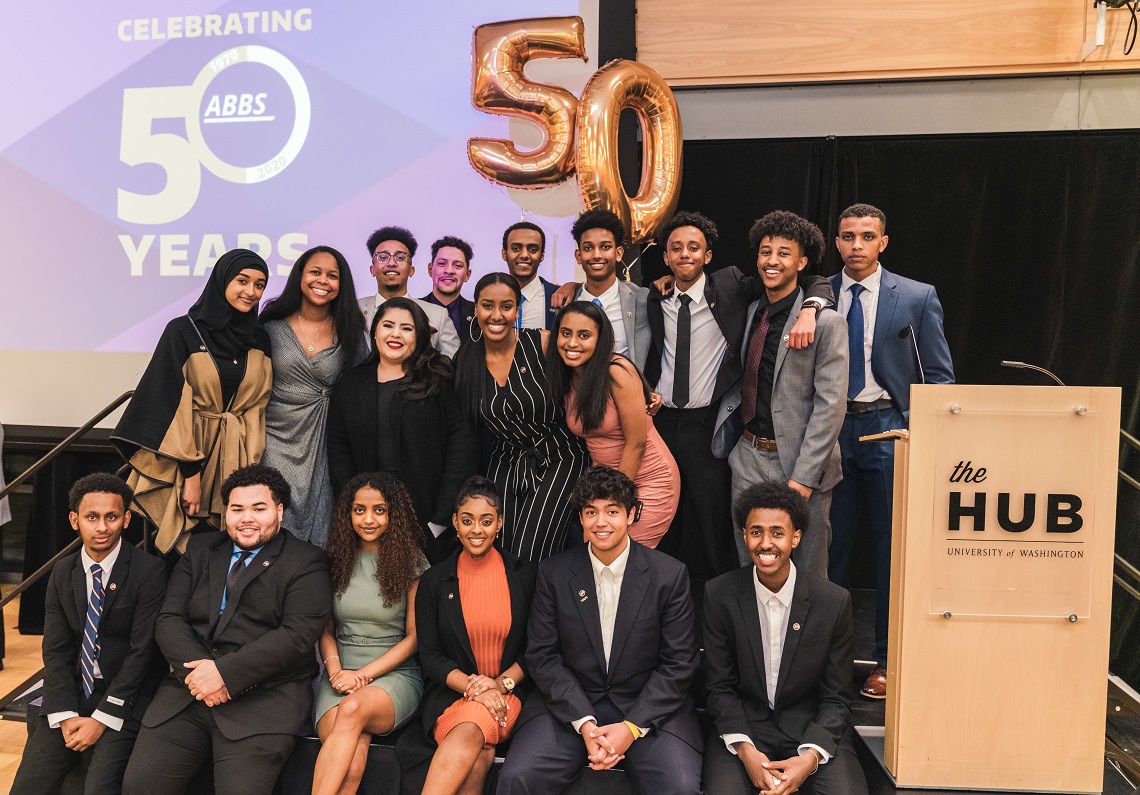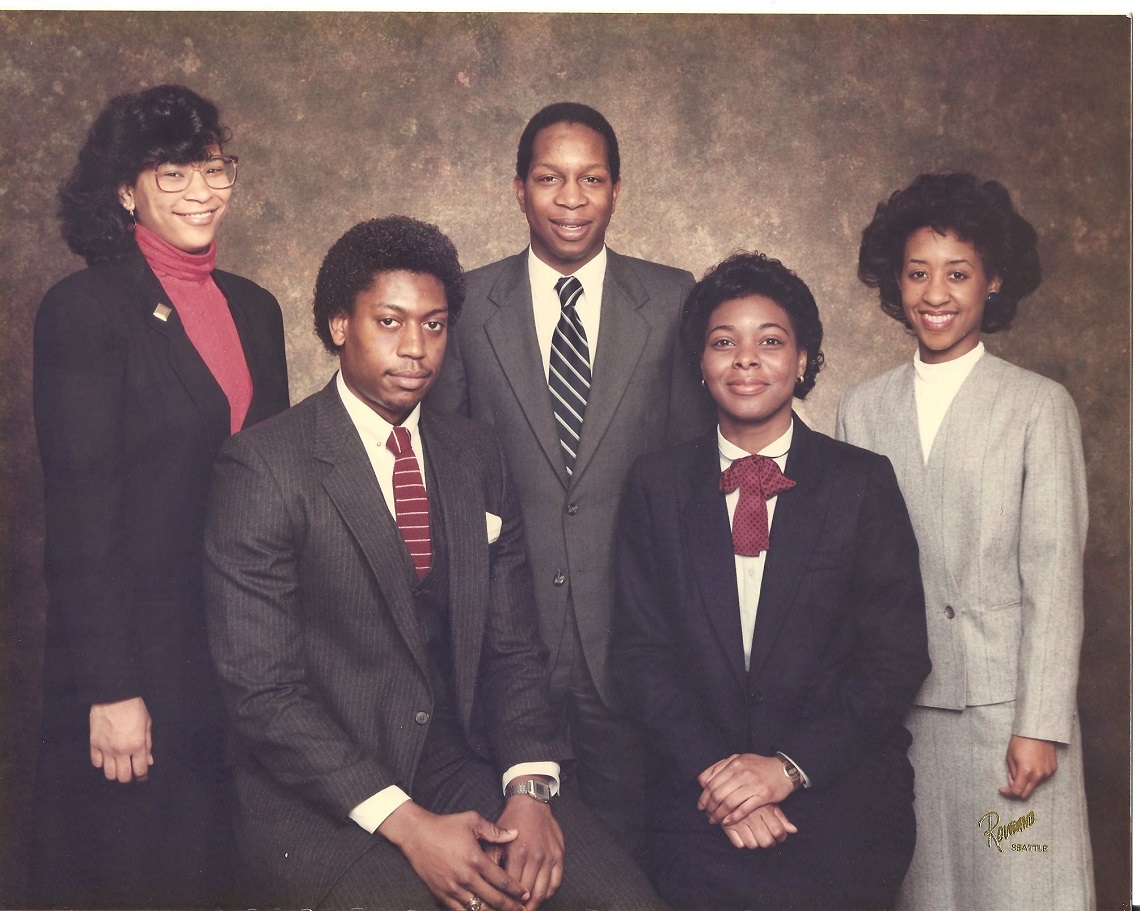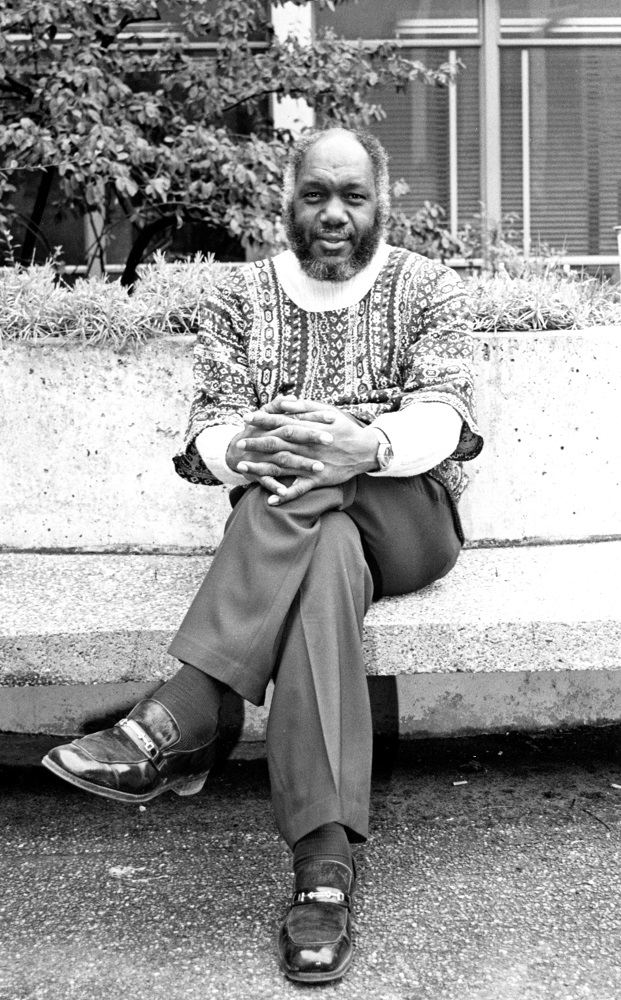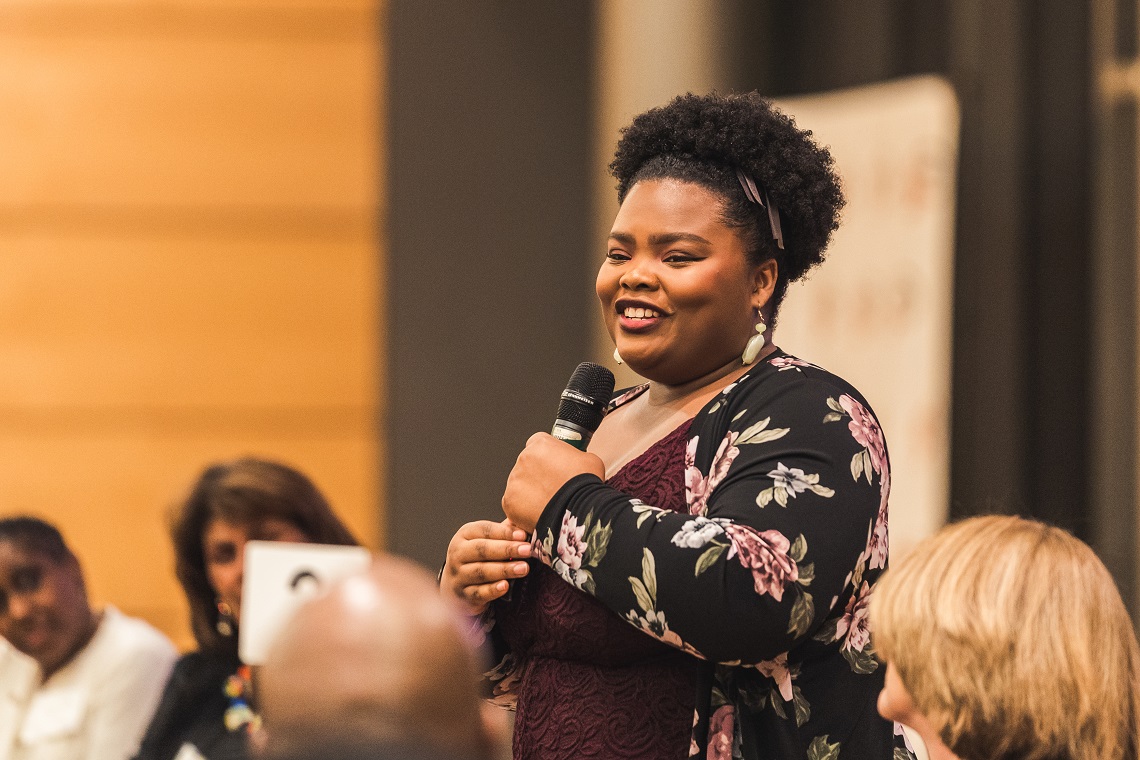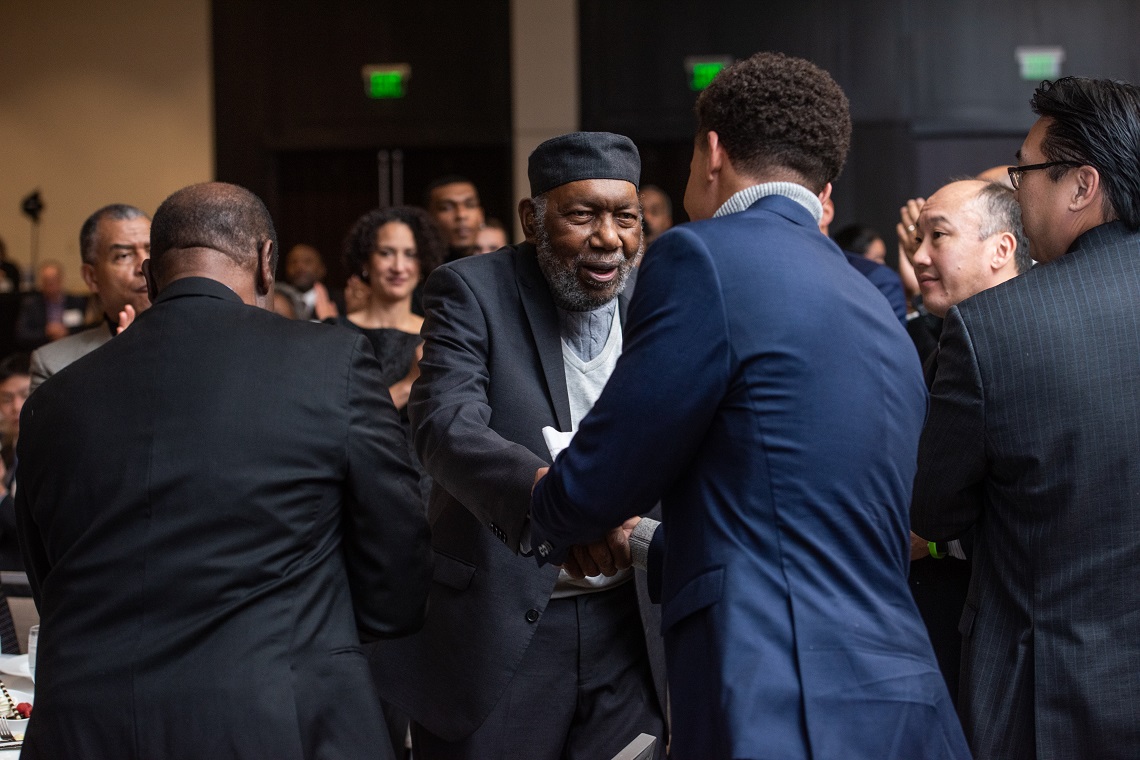On the Shoulders of Giants
The Association of Black Business Students has been advocating for greater diversity, equity and inclusion at Foster for 50 years
By Kristin Anderson
The Association of Black Business Students celebrated its 50th year at the Foster School of Business in 2020. In those 50 years, the student-run organization has worked with faculty and staff to further its mission of recruiting and supporting students of color at Foster. Today’s ABBS leadership wants to build on that rich legacy—and has a vision of where they’d like to see the organization in the next 50 years.
Founding grad students
In 1970, social revolution was happening everywhere, at full speed. Students across the United States were organizing. Protests against the Vietnam War and social injustice unfurled across the country. In Seattle, three graduate students at the University of Washington Business School were watching what was happening at other schools. Earl Vinson, Aubrey Armstrong and Harold Lucius—each of whom went on to earn doctorates—found themselves facing a big decision.
“We had a choice of not doing anything or following the road less traveled,” said Dr. Vinson at the ABBS 50th anniversary celebration in February 2020. “We decided to strengthen the ladder on which we had recently climbed.”
With that decision, the trio created the Graduate Association of Black Business Students (GABBS). The organization was designed as a way to convene and support students of color within the business school.
The students quickly got to work. After earning credibility by organizing a conference on Black business development, featuring speakers of national repute, and providing consulting to Black-owned businesses and advocacy to the community, they met with Dean Kermit Hanson to discuss their initial demand from his administration: a Black professor. In 1972, Thaddeus Spratlen became the first Black professor at the business school and the first faculty advisor to GABBS.
“You had vocal students who were very active in advocating for faculty and more students of color,” says Spratlen. “Diversity has long been at the core of the organization.”
Seven years later, student leaders of GABBS decided to change the name of the organization to the Association of Black Business Students, or ABBS. This allowed the organization to expand its membership and support Black students in the undergraduate program.
“I think ABBS became more diverse because you had participation across different groups within ABBS,” says Spratlen. “One of the things about promoting diversity is that it becomes an integral part of the program, of the activities, of the communication—that students have to adjust and learn how to deal with differences. Those students defined a vision that has had a lasting impact at Foster.”
An expanding mission
ABBS was founded on a mission to recruit, assist, organize and promote the interests and success of Black students at the UW who are studying business or interested in pursuing business careers. But as the organization grew, it became more about supporting personal, academic and professional growth for its members.
There were recruitment efforts to increase diversity within the business school student body. Study groups were formed to help students succeed in the classroom. Diane Martin, a former career services manager and staff advisor to ABBS beginning in the 1980s, mentored students and helped them secure internships and connect with professional organizations.
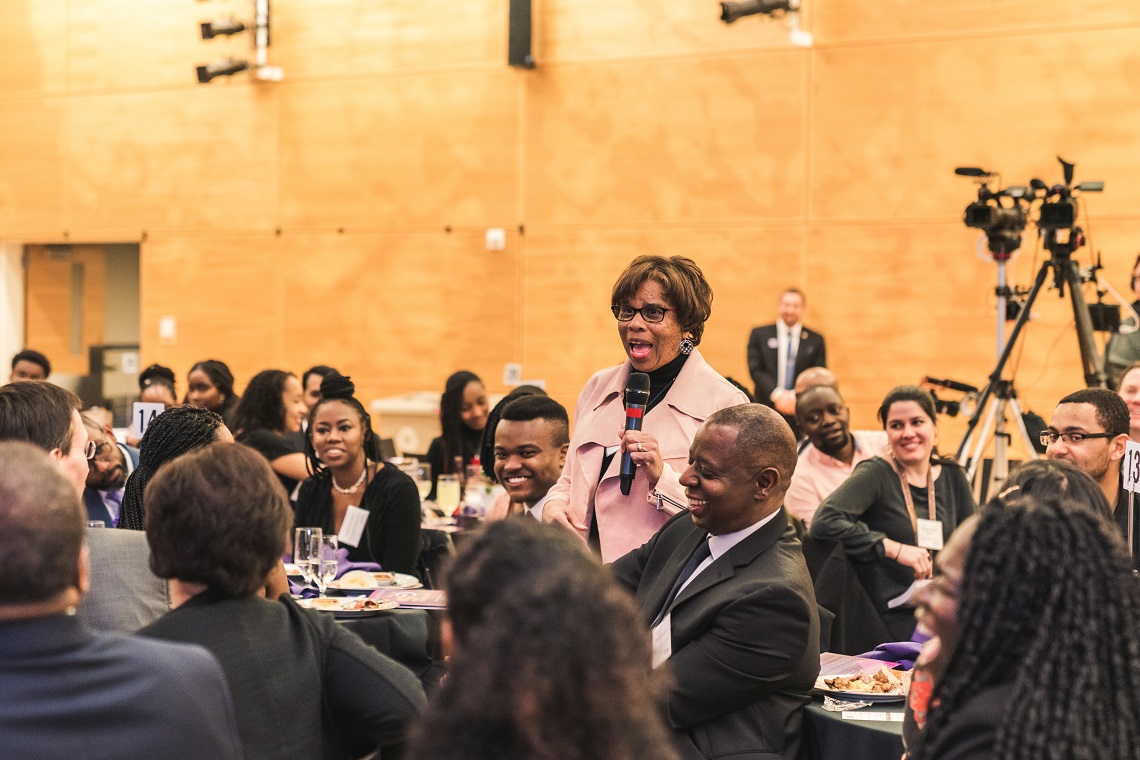
Diane Martin, former ABBS staff advisor and recipient of the Spratlen Legacy Award, speaks at the ABBS 50th anniversary celebration.
For many years, ABBS was the only group for students of color at what is now the Foster School, making it a place for students to get support while dealing with very real issues. With so few Black students within the business school, many found themselves feeling alone in some classes.
“It could be very traumatic,” says Martin. “Other students didn’t want to sit next to them. They wouldn’t be accepted as teams were being formed. It has a dramatic effect on your ability to succeed when you’re isolated like that; it makes you question your ability.”
ABBS gave those students a place to go and share their experiences. When they realized they weren’t alone, the students started working together to enroll together. “It eliminated that feeling of being alone,” Martin adds. “You felt like you have support, and that’s what ABBS provided.”
Present tense
As ABBS celebrates its 50th year, current members are looking at what they can do now to establish the next 50 years of legacy. There are 111 Black students among the 3,620 currently matriculating at the Foster School. After the retirements of Spratlen and former Dean William Bradford, there is currently no Black faculty member at Foster.
This reality reflects ABBS itself. Membership, along with Black representation in the student population, has ebbed and flowed over the years. At a low point, ABBS membership was only six. While the student leadership has always worked to recruit Black students to Foster and support them while they are there, many students reported facing similar issues as ABBS members from previous eras.
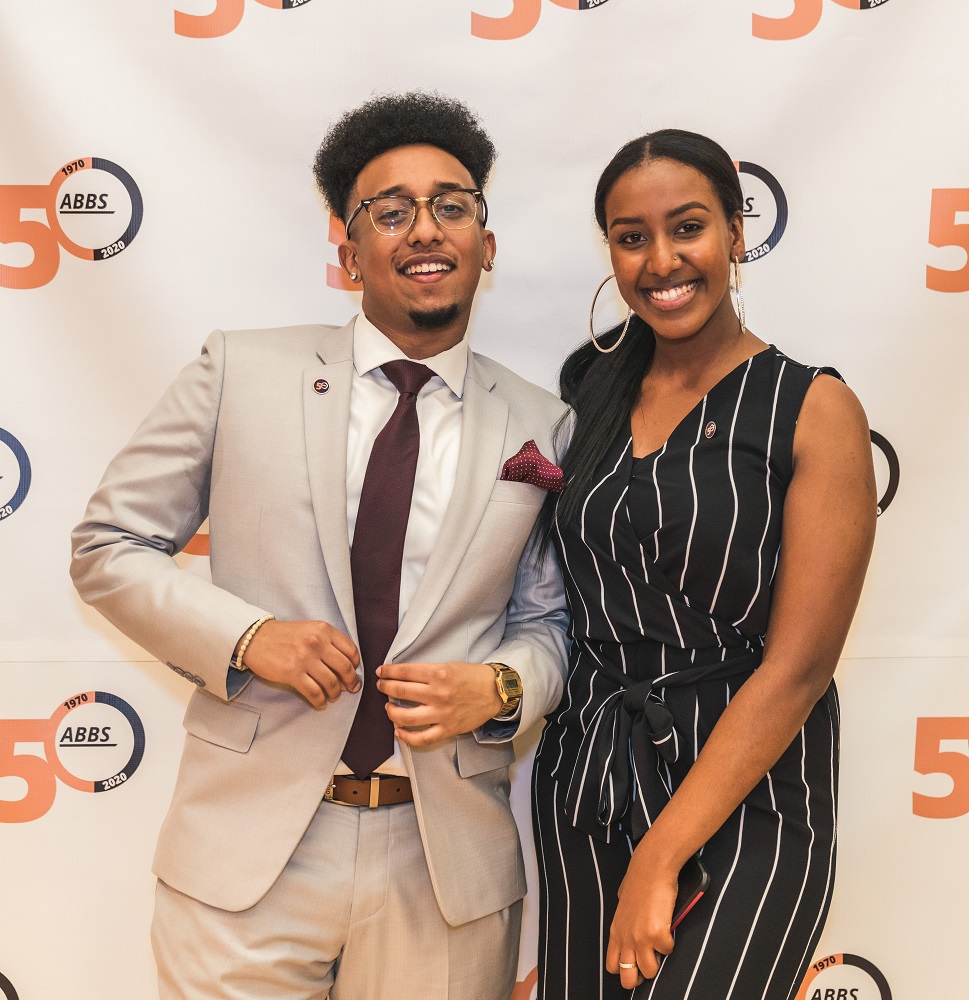
Foster seniors Natu Abraham Wintana Dawit served as emcees of the ABBS 50th anniversary celebration.
“In my first couple months at the UW, I didn’t see a lot of people that look like me,” says Natu Abraham (BA 2021), ABBS past president and senior advisor. “So that was discouraging.”
The Foster School offers a lot more resources to students of color today, including Undergraduate Diversity Services, which was established in 2001. UDS staff offer a wide range of programs—Young Executives of Color, Business Bridge, Business Education Opportunity Program—designed to address the disparity of minority students at the Foster School. It was through those resources that Abraham, and others, found their way to the ABBS community.
And ABBS is no longer the only organization representing the diverse spectrum of students at Foster. There is Diversity in Business and the Association of Latino Professionals for America, Out in Business and the Native Business Association, Women in Business and First Generation Business Leaders, among others.
Better together
ABBS is not even the only club representing Black students. In 2010, the UW chapter of the National Association for Black Accountants (NABA) launched, causing a temporary rift. “We were splitting what few Black students there are at Foster, and that wasn’t right for our community,” says Abraham.
So, they joined forces to start Black@Foster, with both groups operating under one umbrella to fulfill their shared missions.
Both groups benefit from an increase in meeting attendance—which has more than doubled. And ABBS students are able to make connections through the national NABA network, while NABA members can connect with ABBS alumni and community that has developed over the past 50 years.
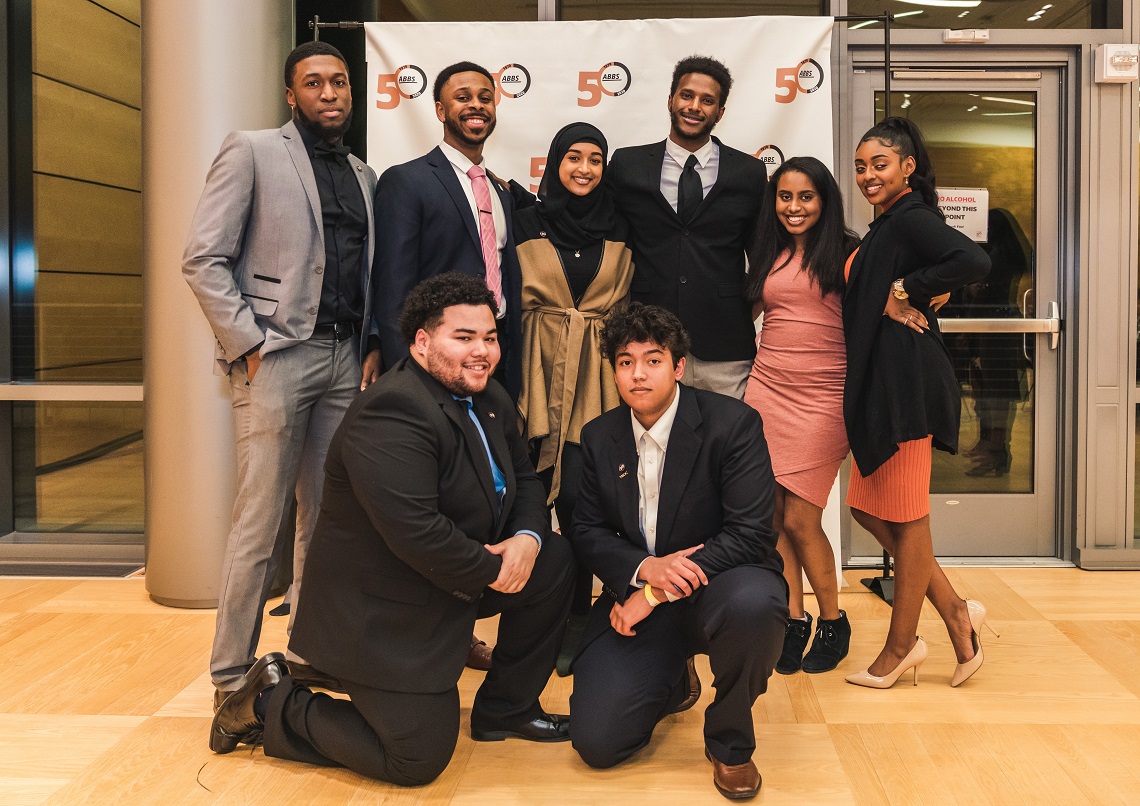 “We are able to use more connections and have more companies come to visit us,” explains Abraham, who was ABBS president during the creation of Black@Foster. “Having this collaboration of two different resources coming together is really beautiful.”
“We are able to use more connections and have more companies come to visit us,” explains Abraham, who was ABBS president during the creation of Black@Foster. “Having this collaboration of two different resources coming together is really beautiful.”
Using the connections and resources they have through ABBS and the Foster School, the students are still focused on the recruitment and retention of Black students. Their bigger goal is diversifying the faculty.
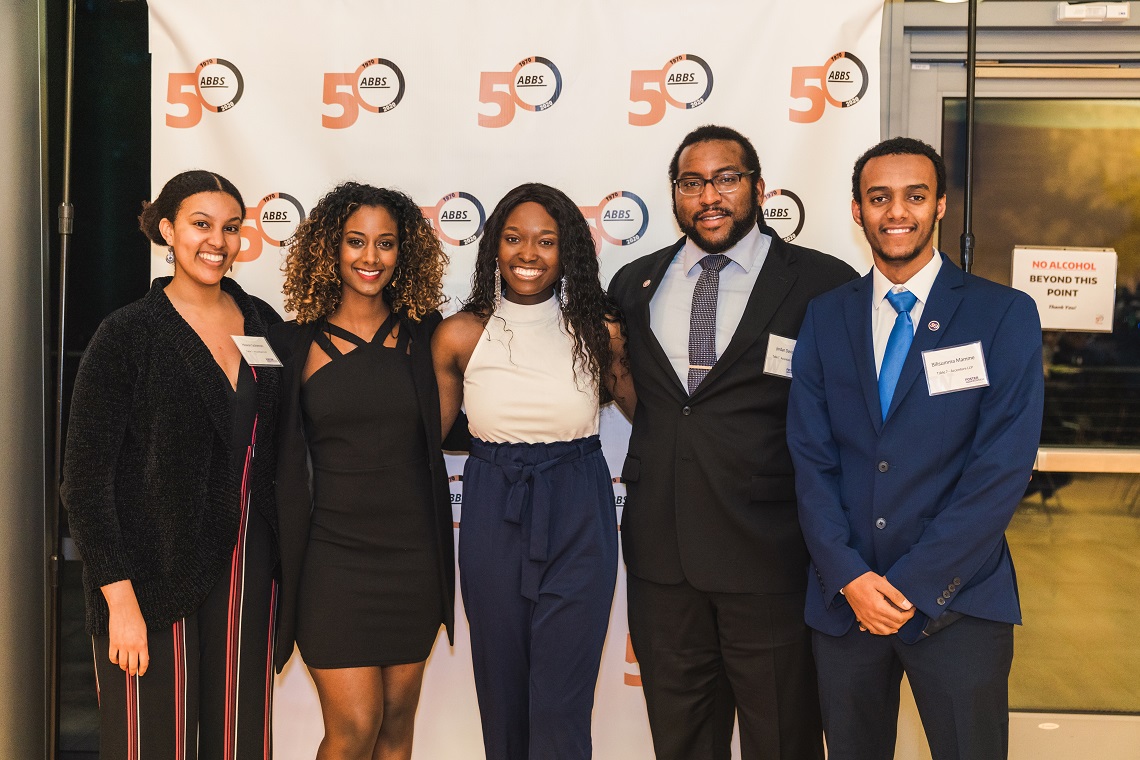 “To see someone who’s the same color as you, comes from the same background as you, and has made it—that gives you an opportunity and the confidence that you can do it too,” says Foster senior Biniyam Eshete, the VP of operations for ABBS.
“To see someone who’s the same color as you, comes from the same background as you, and has made it—that gives you an opportunity and the confidence that you can do it too,” says Foster senior Biniyam Eshete, the VP of operations for ABBS.
Martin adds that all students benefit from seeing role models who are people of color or come from different backgrounds: “They need to be able to see that, they need to be able to interact, because the world is diverse.”
Accelerating progress
The students have acted. A group, many of which are ABBS members, met with Dean Frank Hodge and Christina Fong, Foster’s new associate dean of inclusion and diversity, to discuss what the school can do to improve diversity, equity and inclusion among the student and faculty populations.
“It was absolutely gutting to hear our students say they could spend four years at Foster and not be exposed to leaders and experts that look like them and that they can identify with,” says Fong.
 Fong noted the school is taking several steps to incorporate a DEI lens into faculty searches to ensure Foster is attracting and recruiting from a diverse pool. Dean Hodge also created a new position called the Dean’s Impact Scholar, which will invite diverse individuals from the business community with an interest in higher education to Foster to mentor and teach students.
Fong noted the school is taking several steps to incorporate a DEI lens into faculty searches to ensure Foster is attracting and recruiting from a diverse pool. Dean Hodge also created a new position called the Dean’s Impact Scholar, which will invite diverse individuals from the business community with an interest in higher education to Foster to mentor and teach students.
Improving inclusion and diversity at the Foster School is one of Dean Hodge’s biggest goals. Current ABBS students say they are excited to work with Hodge and Fong to help make that goal a reality and to help find more ways to support students of color.
“We need to be able to recognize and acknowledge some of the ways in which our Black students have not been served by the Foster School,” says Fong. “It is important to me that we work together to create meaningful pathways for the Black student voice to be heard and respected within our school.”
In the spring, amid the protests that followed the killing of George Floyd, ABBS students were able to quickly set up a meeting with Foster leadership to discuss how the school could help them process this horrifying episode of social injustice.
“It was really impactful because they gave us the platform to share how we feel, speak with no filter and express the pain we felt at the time,” says Abraham. “We had to advocate for our own voice, which we shouldn’t have to do, but we did.”
Foster, the future
While celebrating the Association of Black Business Students’ impactful 50 years of outreach and advocacy, current members and leaders are also reflecting on changes they can make while at Foster to add to this rich legacy and build upon the work of its founders.
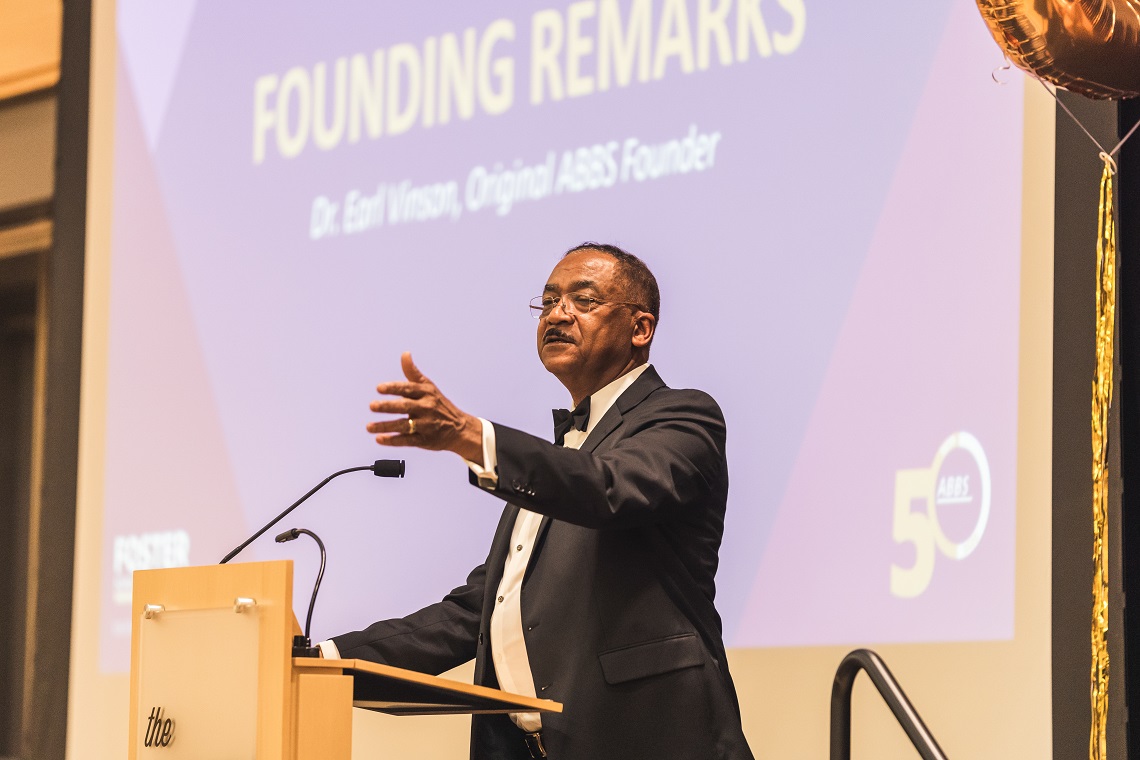
Dr. Earl Vinson reminisces about the founding of GABBS and ABBS at the 50th anniversary celebration.
“We want to be the inclusive community to help one another. That’s the best part of the legacy that we’re able to leave,” Abraham says. “For the next 50 years, the biggest goal for me and my cohort is to come back and keep the school accountable, and make sure the student body is flourishing and maybe doing better than me.”
The current students in ABBS are standing on the shoulders of giants who paved the way for them, and they are prepared to continue paving the way for the future generations of ABBS.
“It is incredible to be part of something this big, that’s been there for so long, and to pick up from so many of the leaders that have been part of this program,” says Eshete. “I’m looking forward to seeing what we can do this year and the kind of changes we can make.”
Seizing the Day for DEI
By Frank Hodge and Christina Fong
Since stepping into our new roles at the Foster School, we have established a strategic priority to incorporate a diversity, equity and inclusion (DEI) focus into every decision we make.
Together with the input of faculty, staff, students and alumni, we have established a set of guiding principles for how we will approach our work in this area:
- DEI is everyone’s work. It is a shared responsibility that requires every member of the Foster community to think deeply about how we do our work and how our work impacts others.
- Listen first. Recognize that we will make the most meaningful and impactful change if our decisions are driven by listening to our community. Actively work to build structures and pathways for all voices to be heard.
- Systemic over episodic change. Trainings and celebrations are not enough to change our culture. We also need to do the hard work of changing the systems that dictate how our work gets done, work that may be less visible today but will have greater impact in the long run.
- Progress, not perfection. DEI work is hard, and we will all make mistakes as we navigate the nuances and complexity of discussing difficult topics and making difficult decisions. We will support each other by focusing on growth and learning and extending grace to each other as we try new things, cope with vulnerability and push ourselves outside our comfort zones.
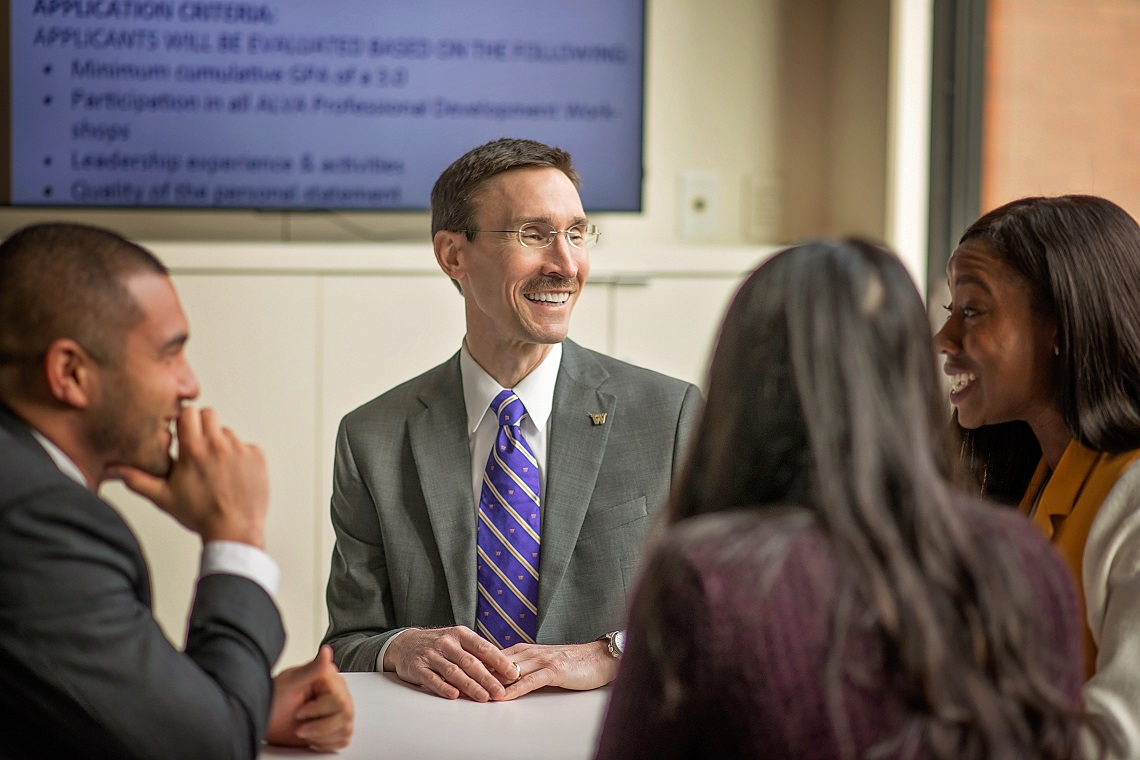 With these guiding principles in mind, here are some of the steps we are already taking:
With these guiding principles in mind, here are some of the steps we are already taking:
Expanding thought leadership to ensure that Foster students are exposed to a greater diversity of authorities, experts and role models in our classrooms. We have established a new Dean’s Impact Scholar position to invite leaders from our diverse business community to mentor students and provide valuable strategic consulting on our DEI efforts, and we’re rewriting job descriptions to be more attractive to a greater diversity of candidates.
Creating belonging in our classrooms and community by equipping faculty with best practices for teaching more inclusively, by training faculty leaders to identify bias, prevent microaggressions and create an inclusive learning environment, by diversifying case study protagonists, by creating an active community of practice related to DEI issues, by promoting a DEI focus among student organizations, and by re-envisioning our DEI website to help our community engage in conversations and action.
Increasing access and outreach by establishing the Fostering Inclusion and Diversity Fund (supported by all levels of Foster leadership), by creating a DEI dashboard to track our progress, and by continuing to invest in programs widening pathways into the Foster School, such as Business Bridge and Young Executives of Color.
There is hard but critical work ahead of us if we are to fulfill our commitment to creating a community in which everyone feels safe, heard and valued. We will continue to learn more, work more and keep fostering progress toward these ideals.
We invite you to reach out with thoughts, ideas or input as we continue on this journey. We are committed to the continuous improvement embedded in our motto: Better Together, Better Tomorrow.
Frank Hodge is the Orin and Janet Smith Endowed Dean and a professor of accounting ([email protected]). Christina Fong is the associate dean of inclusion and diversity, the William D. Bradford Endowed Professor, and a teaching professor of management ([email protected]).

